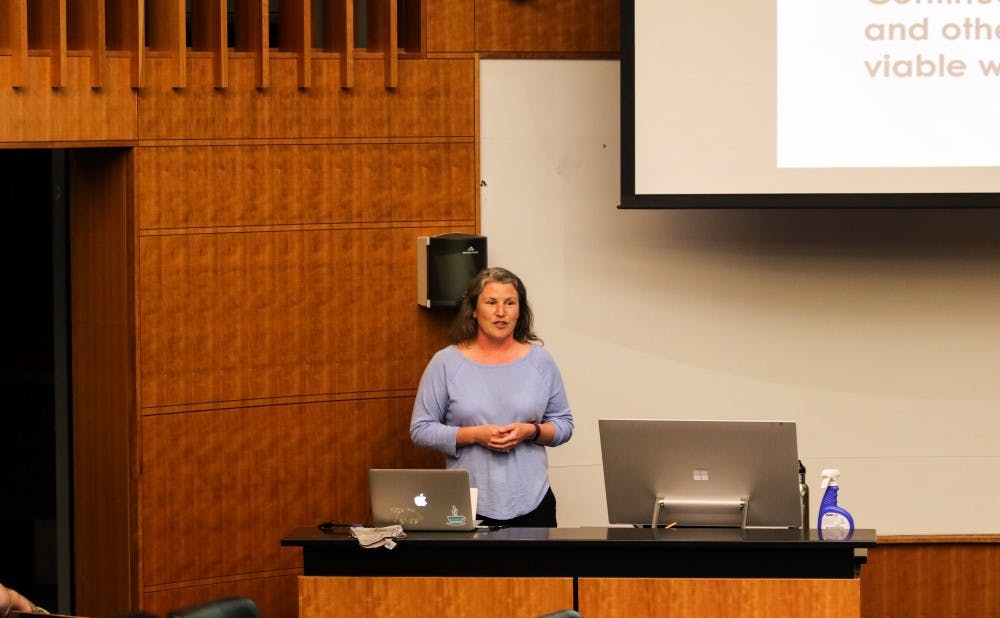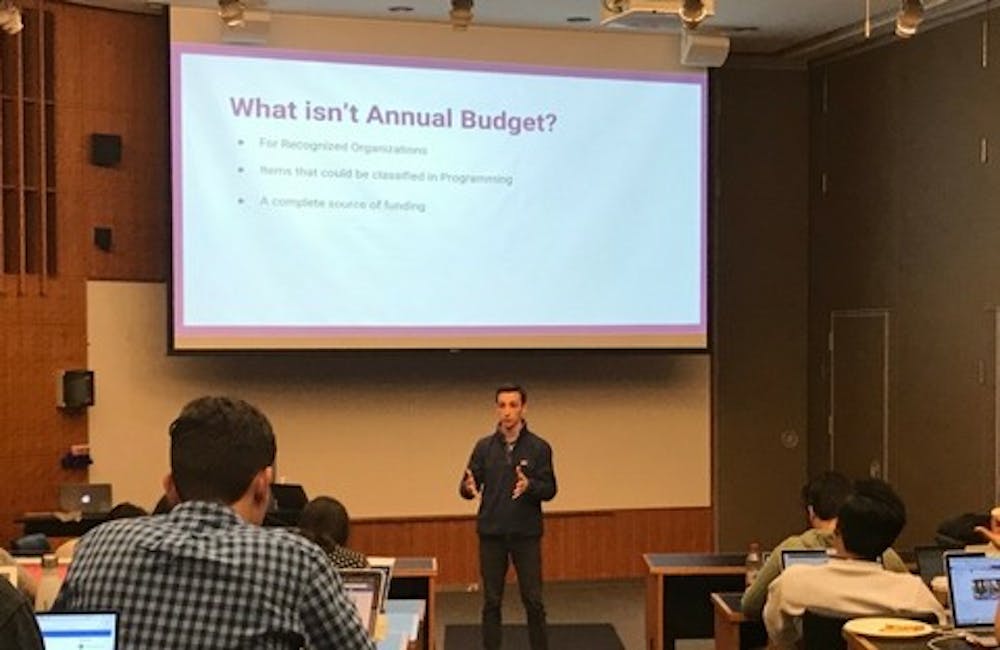The Duke Student Government Senate had its first reading of the 2018-2019 annual budget at Wednesday’s meeting. Senators will be able to propose amendments at next week’s session.
Funds from the annual budget can go toward group-only events—including general body meetings, retreats and conferences—registration and dues and for large capital expenditures. Junior Luke Farrell, chair of the Student Organization Financing Committee, added that not all of the requests could be funded.
Farrell said that over $800,000 in requests were filed for annual budget funding. Farrell presented SOFC’s approved $415,922.33 allocation.
“We can afford about half of what we received,” Farrell said. “Basically, groups’ funding requests are halved.”
Farrell also presented a few disclaimers about the annual budget. Farrell emphasized that there is “no way to truly standardize” the process of allocating funds to all proposed budgets. The annual budget’s primary goal is to “subsidize the highest priority expenses for groups and to be holistically fair.” He advised the senators to consider SOFC’s recommendation strongly, as SOFC has spent “an unreal amount of time considering each of these budgets.”
Despite some fluctuations, SOFC has allocated fewer annual budget funds over the years. He elaborated that “every SOFC chair for the past ten years” has followed suit in decreasing annual budget allocations. Farrell attributed this to the fact that money that is not allocated to the annual budget will go toward programming funds for the following academic year. To Farrell, the programming fund is a “more efficient way to allocate money” than the annual budget.
“If you add [$20,000] to this budget just know that you are cutting [$20,000] from the programming budget next year,” Farrell said.
However, last year had a record-low allocation at $367,380.02. This year’s sum is more comparable to 2016’s, which was $415,890.87. Thus, because of the prior year’s record low annual budget allocation, Farrell said that SOFC will most likely be running a programming surplus this year.
“We spent way too little on the annual budget last year,” Farrell said. “This year we need to spend it in more of an intentional way…we are overspending in comparison to last year, but I think rightfully so.”
For the first meeting, Farrell recommended for senators to read the proposed budgets, a slideshow about the annual budget and the annual budget guide. Senators who wish to propose amendments to the annual budget should seriously consider such changes and contact Farrell before next week. Farrell also advised senators to work with groups specifically.
In his role as SOFC chair, Farrell does not believe it to be his job to evaluate how important a group is to campus because he does not have adequate context to make that judgment.
“I consider all groups equal in value to campus,” Farrell said. “It is not a value judgment. I think your service organization does great work. I am not funding you because I do not think you are doing great work.”
Above all, Farrell pinpointed four things senators should have as a “frame of mind” for approaching the annual budget. He reminded senators that annual budget allocations are “student money” and that the subsidies at hand are “based on student priorities presented to SOFC.” He noted that increasing the overall annual budget allocation takes away from the amount SOFC can allocate to programming events in the 2018-2019 academic year.
“The primary role of SOFC is to make gray area decisions,” Farrell said. “And, everything involved in the annual budget is a gray area.”
In other business:

The Senate passed a resolution “to urge Duke University to study the transparency, use and ethics of legacy status" in the undergraduate admissions process. Senior Elizabeth Barahona, vice president of equity and outreach, senior Kevin Mutchnick, senator for academic affairs, and junior Kayla Thompson, senator for campus life, presented the resolution.
Senior Davis Lovvorn, a legacy student, spoke during public forum to provide his perspective on the resolution. Although he agreed with most of the resolution, Lovvorn argued that a clause of the resolution appeared to be questioning the value of legacy students.
“Whereas the appointment of a joint committee will allow a panel of engaged and committed members of the Duke community to re-examine the value that legacy preference brings,” the clause in question read.
“I worry that the last point of the resolution not only inaccurately diminishes the value that legacy students bring to the University but also sadly throws us all into one basket,” Lovvorn said. “I know you have good intentions. I want to see change as much as you do, but there are some of you who question the value that students like me bring to the University….well, I am here to tell you that I belong here. And, in fact, we all belong here.”
First-year Jia Jia Shen, senator for equity and outreach, amended the clause to which Lovvorn to read that a joint committee will examine “the value of legacy preference in the admissions process” instead of “the value that legacy preference brings.”
Junior John Desan, director of environmental affairs, gave a presentation on a “no-waste picnic basket” pilot program. Desan envisions the program to provide students with “on-campus activity that is cheap, easy and fun” to learn more about sustainability and to explore the outdoors—especially the Sarah P. Duke Gardens.
He said hopes the program to be implemented “full-scale” in the future, including an expanded to-go container project and being able to check out a basket on an electronic form. The Senate allocated $174.36 from the DSG surplus fund for the program, including four picnic baskets, four picnic blankets, laundry and Fedex printing and lamination for a sustainability fact sheet.
The Senate chartered Duke Impact Investing Group, Duke Political Union, Duke Students for Justice in Palestine and Peer Advocacy for Sexual Health. Duke American Sign Language and Duke Low-Income First-Generation Engagement were recognized. The International Association was provided $3,100 and the National Alliance on Mental Illness at Duke University was given $2,815 for programming events.
Get The Chronicle straight to your inbox
Signup for our weekly newsletter. Cancel at any time.

Stefanie Pousoulides is The Chronicle's Investigations Editor. A senior from Akron, Ohio, Stefanie is double majoring in political science and international comparative studies and serves as a Senior Editor of The Muse Magazine, Duke's feminist magazine. She is also a former co-Editor-in-Chief of The Muse Magazine and a former reporting intern at PolitiFact in Washington, D.C.

